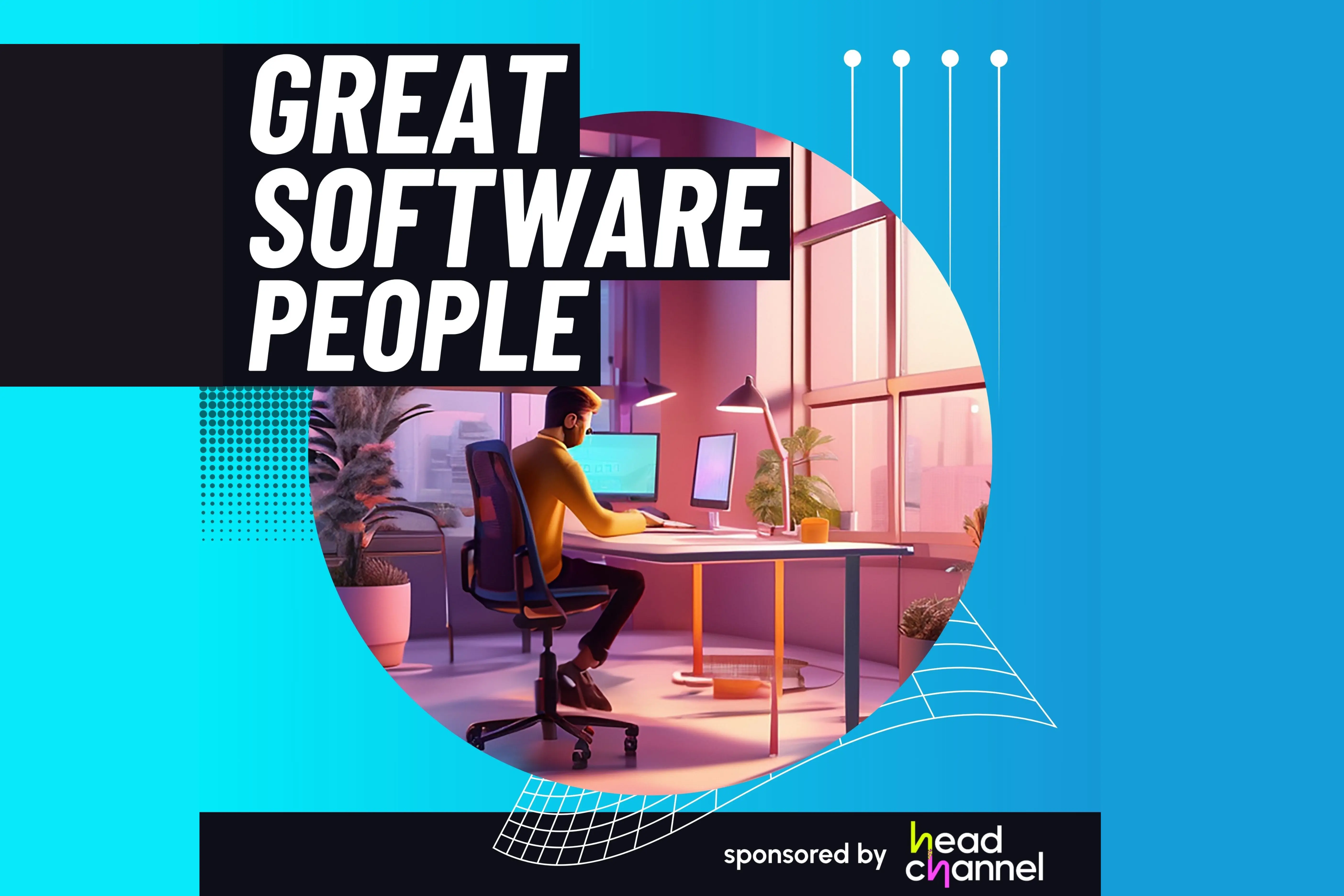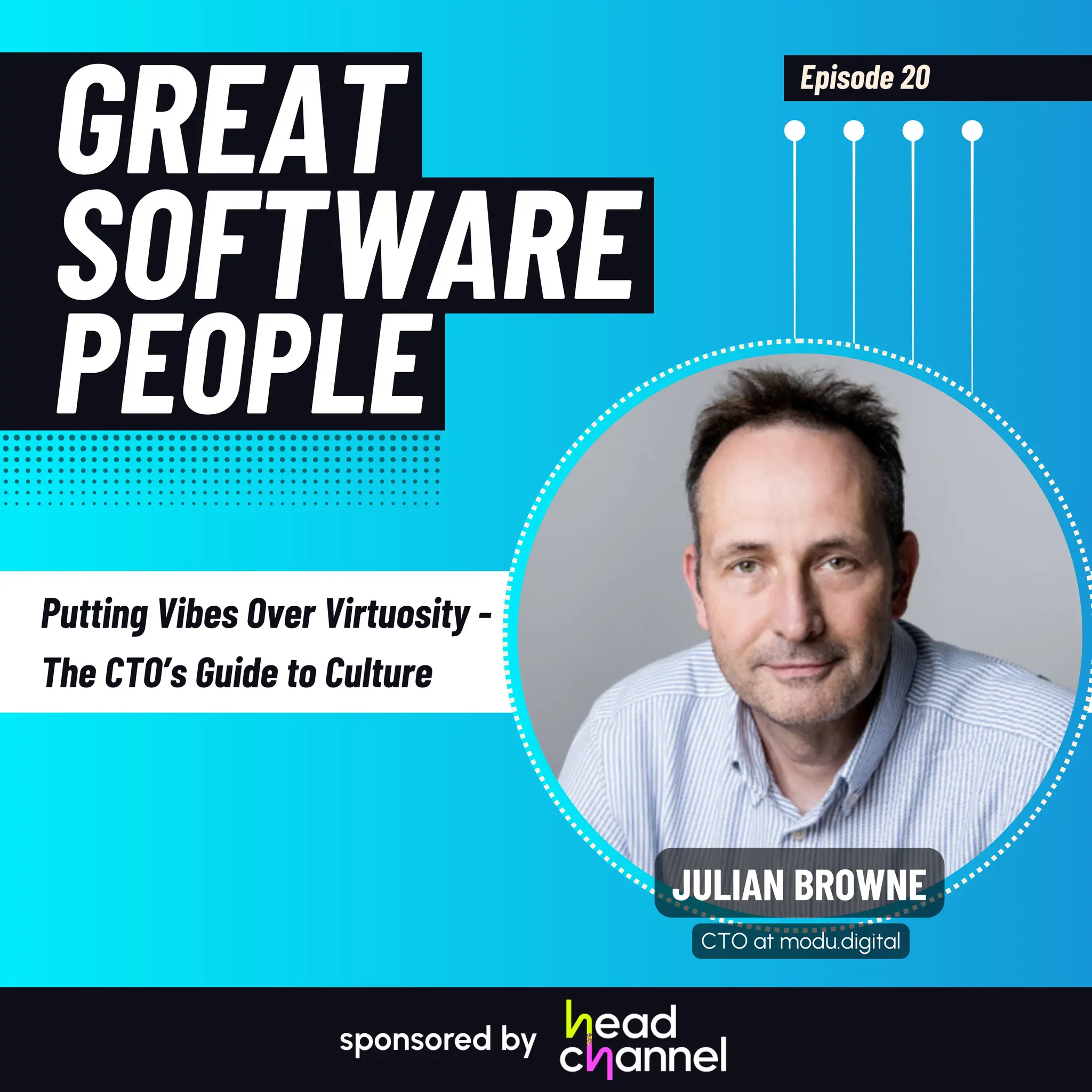
Putting Vibes Over Virtuosity - The CTO’s Guide to Culture with Julian Browne - Episode 20
Julian Browne’s storied career is one with some stellar highlights, from a remarkable selection of CTO roles, to leading roles at businesses like Hive.
He wasn’t always destined for software, however, as a path set for biology gave way to a passion for technology…
Julian’s approach to team dynamics and constant course-correcting is exemplary for any aspiring CTO - discover how he learned to lead teams in the tech space, and how you can do the same, on episode 20 of Great Software People!
This episode covers:
-
The best lessons you’ll learn being from the toughest challenges
-
Why culture is key over relying on star programmers
-
The different approach to comms when operating as a CTO
-
Using a blog to promote better practices in the industry

Episode highlights
“The best learning experiences you’ll ever get in life is when it’s difficult - you don’t know it at the time, but the jobs you struggle with the most are the ones you’ll look back and realise taught you the most.” - 10:45 - Julian Browne
“What I found is that most of the people that were in architecture didn’t come from a software development background or a systems and operations background. They would use PowerPoint to describe why the system that the company currently had was awful, but they weren’t necessarily understanding how this thing would work.” - 26:15 - Julian Browne
“You need to be the kind of architect that is able to have a sensible conversation with a developer when they tell you that your diagram doesn’t make any sense, and you don’t know what you’re talking about, because they’ve now uncovered a bit of detail.” - 31:00 - Julian Browne
“When you’re a CTO, the people that you’re having to communicate with are people on the exec team, or the boards, or investors - they’re not a software engineer. Clarity of communication is critical.” - 44:20 - Julian Browne
“People talk about things like psychological safety. It’s like a fish in water - when it’s naturally there you can’t see it, it’s just a thing around you.” - 49:00 - Julian Browne
LISTEN HERE:
[00:00:13]
Rich: Welcome to another episode of Great Software People! I’m absolutely over the moon to have with us today someone I’ve known for a very long time: Julian Browne, CTO at Modu Digital. Julian and I first met back in 1997—or maybe it was earlier? We’ll unpack that as we go. Welcome, Julian!
Julian: Thanks, Rich. I think it might have been 1994, actually, because it was a web-based project, and back then, not many people were working on the web.
[00:01:28]
Rich: Let’s go back even further—when you were a kid, what did you want to be when you grew up?
Julian: Definitely not in software! Like many kids, I thought I wanted to be a vet, then a marine biologist. That was likely influenced by lots of documentaries on TV at the time. I was good at biology in school, so it felt natural to pursue that.
[00:02:55]
Julian: I went to Birmingham University to study biological sciences, but about halfway through my first year, I realised I didn’t feel any passion for the idea of doing that as a job. Then came a moment that changed everything: I was ill with the flu and missed most of a Fortran programming module. When I finally showed up, I had two days to catch up on the course.
Rich: That must have been stressful!
Julian: Surprisingly, no. My dad had bought me a ZX81 when I was a teenager, and I’d been obsessed with programming ever since. By the end of the first day, I was halfway through the Fortran module. By the second, I’d overtaken everyone else. The lecturer even said, “Have you thought about this as a career?” And that was my lightbulb moment.
[00:06:11]
Julian: I left Birmingham University and applied to Plymouth University, which had a relatively new course: computing with informatics. I graduated in 1990 after doing a thick sandwich year at ICL (now Fujitsu).
[00:08:45]
Julian: After university, I went back to ICL, where I worked on big public sector projects—water companies, electricity companies, that sort of thing. The projects were massive, waterfall-driven, and often over budget. I learned a lot, mostly from seeing what not to do.
Rich: That must have been formative.
Julian: Definitely. It taught me the value of learning through struggle. You don’t realise it at the time, but those tough experiences shape you.
[00:15:15]
Rich: The web really started taking off in the mid-90s. How did you get involved?
Julian: I was working at a consultancy in Pangbourne, and a colleague introduced me to HTML. We took a traditional thick client-server application for a water company and reengineered it into a web-based system. It was obvious that the web was going to change everything, but selling it back then was tough—nobody really understood it yet.
[00:19:36]
Julian: That’s when I got my first web-based job: building an intranet for Mars. It was one of the first corporate intranets, designed for knowledge management—everything from cafeteria menus to competitor analysis.
Rich: And that’s where we met!
Julian: Exactly. Back then, finding people with web experience was rare. You got the job because you knew what port a web server ran on!
[00:22:00]
Rich: After Mars, what was next?
Julian: I contracted for the next 20 years, working with big names like VisaV, Vodafone, and several banks. VisaV, for example, was a joint venture between Vodafone and Vivendi, focused on early multimedia experiences for smartphones.
[00:25:40]
Rich: You eventually transitioned into architecture roles. How did that happen?
Julian: It sort of happened organically. I moved into architecture because I was frustrated by the disconnect between developers and the enterprise architects I worked with. Many architects back then were focused on creating polished PowerPoint presentations, not solving real technical problems.
[00:30:00]
Rich: Is that when you became disillusioned with traditional architecture?
Julian: Yes. A lot of it felt like selling vendor-driven solutions without understanding the nuances of how they’d actually work. That’s when I started focusing on distributed systems and simplifying architecture in practical ways.
[00:31:03]
Rich: You also started a blog around that time. Why?
Julian: Blogs were gaining popularity in the early 2000s, and I was inspired by writers like Joel Spolsky and Paul Graham. They demystified complex topics and made me feel like I wasn’t crazy for questioning the status quo. I wanted to do the same, especially for people in large organisations dealing with complex systems.
[00:36:00]
Julian: One post that stands out is my explanation of the CAP theorem. I compared it to the Sex Pistols, because everyone claims they were there when Eric Brewer introduced the CAP theorem, just like everyone claims they were at the Pistols’ first gig.
Rich: Brilliant analogy!
Julian: That post got a lot of traction, and it taught me the value of breaking down complex ideas into simple, relatable concepts.
[00:39:42]
Rich: Did the blog influence your transition to CTO?
Julian: Indirectly. Writing helped me clarify my thoughts and communicate better. As a CTO, communication is everything. You spend most of your time translating technical challenges for non-technical audiences and aligning everyone around a common vision.
[00:45:00]
Julian: Over time, I also realised that success isn’t about having a team of “rockstar” developers. It’s about creating the right culture. If you give teams autonomy and empower them, they’ll surprise you with what they can achieve.
[00:50:14]
Rich: That’s a great insight. So, what’s the secret to a great team?
Julian: It’s all about culture, communication, and course correction. Like meditation, it’s about constantly refocusing and ensuring everyone is aligned. When teams feel psychologically safe and supported, they do their best work.
[00:52:32]
Rich: Julian, we could talk all day, but we’re out of time. Thank you so much for sharing your insights. Your blog is a treasure trove, and we’ll link to it in the description.
Julian: Thanks, Rich. I’ve got a lot of ideas for new posts, so hopefully, there’ll be more to read soon!

Contact us.
If you need a partner in software development, we're here to help you.
We will respond to your enquiry immediately.